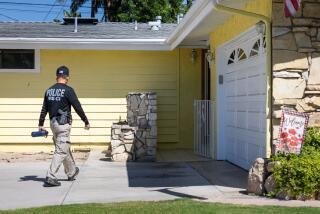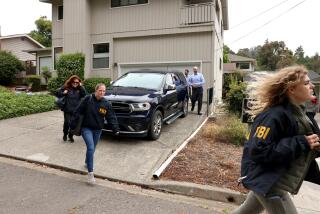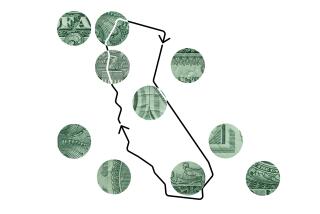Hsia Indicted Over Temple Fund-Raiser
- Share via
WASHINGTON — Democratic fund-raiser Maria Hsia was indicted Wednesday on charges of using money from a Hacienda Heights Buddhist temple to make disguised, illegal campaign contributions to contests ranging from the Clinton-Gore reelection drive to a Los Angeles County supervisor’s race.
A federal grand jury also named the Hsi Lai Temple--which hosted a 1996 fund-raiser for the national Democratic Party attended by Vice President Al Gore--as an unindicted co-conspirator in the alleged scheme that stretched from 1993 to 1996.
Wednesday’s action does not rule out a later indictment of the California temple, though bringing charges against a religious organization would be an unusual step. The matter is being debated inside the Justice Department, legal sources said.
The indictment of Hsia, 47, a Los Angeles immigration consultant, “is yet another step forward in the Justice Department’s investigation of campaign finance abuses associated with the 1996 election,” Atty. Gen. Janet Reno said.
Three weeks ago, the department’s campaign-financing task force obtained indictments of Yah Lin “Charlie” Trie, a longtime friend of President Clinton’s, and Trie’s business associate, Yuan Pei “Antonio” Pan, on 15 counts of conspiracy, fraud, obstruction of justice and election law violations.
The task force’s inquiry appears to be expanding, with additional charges expected over the next two months.
Nancy Luque, Hsia’s defense attorney, said that her client “did not engage in any criminal conduct.” Luque called Hsia’s indictment a “grotesque misuse of the criminal justice system” and an attack on Asian Americans and Asians.
“The only explanation for this indictment is a political one,” Luque said, complaining that campaign finance laws are “too vague and too little known” to be used for criminal prosecutions, especially of members of what she called a “well-meaning ethnic group.”
Hsia’s indictment has been expected for weeks, and Gore’s foes have cited the case as a potential problem for his presidential hopes.
Gore has said he did not realize that the April 29, 1996, Democratic National Committee event at the Hsi Lai Temple was a fund-raiser. But a draft report of the Senate Governmental Affairs Committee, which last year examined a wide range of alleged campaign-finance improprieties, said that it “should have been obvious.”
Chris Lehane, Gore’s deputy director of communications, said Wednesday: “The matters for which Ms. Hsia has been indicted do not involve Vice President Gore. This is now a question for the courts to determine, and we are confident fairness will be done.”
In addition to the Democratic event, Hsia was charged with conspiring with the temple to make contributions through conduits to Republican Don Knabe’s 1996 Los Angeles County supervisor’s race; the 1994 reelection campaign of Sen. Edward M. Kennedy (D-Mass.); the 1996 reelection campaign of his son, Rep. Patrick J. Kennedy (D-R.I.); and Democrat March Fong Eu’s 1994 campaign for reelection as California secretary of state.
The allegedly illegal contributions ranged from an estimated $85,000 to the DNC to $5,500 to Knabe to $500 for Eu.
If convicted on all counts, Hsia could face a maximum prison term of 30 years and $1.5 million in fines. But federal sentencing guidelines would sharply reduce such punishment.
The conspiracy detailed by the grand jury alleges that a variety of conduits--including temple monks, nuns and volunteers; Hsia’s immigration clients; and Hsia herself--were used to make the contributions. The conduits then were reimbursed with funds of the temple’s corporate entity, the International Buddhist Progress Society, according to the indictment.
As a tax-exempt, religious organization, the temple is barred by federal law from taking part in any political campaign and corporate contributions and disguised contributions are outlawed as well.
Behind the scenes, according to sources familiar with the defense negotiations, Luque has long argued to federal prosecutors that if they did not indict the Hsi Lai Temple, the source of all the allegedly illegal campaign contributions, then it would be unfair to charge Hsia as a mere conduit of those funds.
One argument was that the temple acted out of its own self-interest to conceal the political donations to protect its status as a tax-exempt religious center.
In recent weeks, attorneys trying to stave off a threatened federal indictment of the temple have characterized Hsia to federal prosecutors as the person who orchestrated the allegedly illegal scheme of conduit donations.
According to sources familiar with the matter, temple attorneys argued to prosecutors that Hsia and former Democratic fund-raiser John Huang exploited the naivete and goodwill of trusting nuns and monks.
Washington-based attorney Barry Simon, who recently took over defense of the temple, did not return calls for comment.
Whether the temple ultimately is indicted by a federal grand jury, it remains in substantial legal jeopardy.
According to sources familiar with the matter, the Internal Revenue Service is threatening to withdraw the temple’s tax exemption, an action that could cost the Buddhist center several million dollars in back taxes and penalties. At the same time, a pending Federal Election Commission inquiry also exposes the temple to potentially substantial fines.
In the face of such harsh penalties, temple lawyers argued to prosecutors, a criminal indictment would amount to overkill, sources said.
More to Read
Get the L.A. Times Politics newsletter
Deeply reported insights into legislation, politics and policy from Sacramento, Washington and beyond. In your inbox twice per week.
You may occasionally receive promotional content from the Los Angeles Times.









